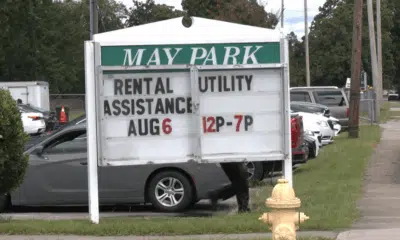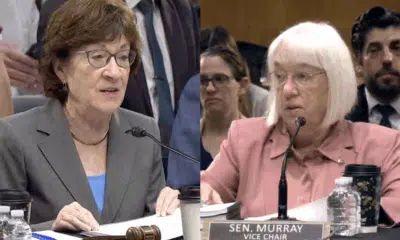News from the South - Louisiana News Feed
Someone paid $2,138 for a reservation at a French Quarter restaurant. Should this be outlawed?
by Wesley Muller, Louisiana Illuminator
April 6, 2025
People are buying and selling table reservations at iconic New Orleans eateries for eye-popping amounts via third-party websites, often without the restaurant’s knowledge.
Critics want lawmakers to ban the burgeoning online business they consider a racket, arguing that it undermines the fine-dining experience and could potentially leave restaurants with empty tables. However, proponents of the practice say it benefits both diners and restaurants when done properly.
Some iconic restaurants topped the list during a recent scan of the New Orleans section of Appointment Trader, one of several platforms designed to let people with scheduling conflicts sell highly coveted reservations on the open market. A Saturday night reservation at Brennan’s later this month is available for a suggested bid of $235 — a discount compared to the whopping $2,138 someone paid for a four-top at Antoine’s during the Super Bowl weekend.
Are those prices based on genuine demand for seating at the restaurants, or is it artificially inflated by technology built to cash in on wealthy tourists desperate to dine in the city’s elite culinary corners?
That’s a question Louisiana lawmakers will try to answer in the coming months as they consider House Bill 90, sponsored by Rep. Troy Hebert, R-Lafayette. The legislation could ban companies such as Appointment Trader, Dorsia and Wuw Wuw from operating in Louisiana.
GET THE MORNING HEADLINES.
Specifically, Hebert’s bill prohibits third-party companies from offering or arranging reservations at any restaurants that have not agreed to the service through a contract.
Hebert could not be reached for comment, but the Louisiana Restaurant Association, a trade group that asked Hebert to file the legislation, said it is modeled after similar laws recently enacted in other states such as New York. They all describe the legislation as a measure to prevent “restaurant reservation fraud.”
Appointment Trader, founded in 2021, lets users buy and sell reservations and appointments of all kinds through auction-style bidding. Sellers can set their own asking prices, and bidders can make offers at any rate. Additionally, prospective buyers can use the platform as a concierge service, offering a fee to any user who can secure them a reservation at a particular establishment.
In its early days, the platform was limited mostly to hotspots such as New York, Los Angeles, Chicago and Las Vegas. It has since gained popularity and expanded into smaller markets including New Orleans and virtually anywhere else one has a reservation they want to sell. As of Thursday, the platform had clocked over $6 million in trades within the last 12 months.
In a phone interview, Louisiana Restaurant Association spokeswoman Wendy Waren said platforms like Appointment Trader are selling reservations without the restaurants’ permission or knowledge. If no one buys the reservations, tables just sit empty, which can cause seating delays or prevent genuine customers from getting a reservation and actually bringing business to the restaurant, she said.
“It creates artificial scarcity,” Waren said. “It’s like somebody’s hijacking the process.”
‘Our backs are really against the wall’: New Orleans restaurants brace for new tariffs
New York hospitality trade groups have accused the platforms of using software bots to snap up reservations and sell them on what they call a “black market.”
Appointment Trader founder Jonas Frey said he is just trying to solve a problem with a legitimate service that can benefit all parties, particularly the restaurants. The 37-year-old software engineer is a German immigrant who came to the U.S. five years ago and came up with the idea for his platform while waiting in a long line at his local motor vehicles office in Las Vegas. He now lives in Miami with his wife and is serious about maintaining legitimacy on his platform, he said.
“I’ve basically lived in a computer all my life, and nothing gives me more joy — well almost nothing — than when thousands of people use the software I built to solve a problem in their life,” Frey said.
In phone interviews this week, Frey explained how users on his platform must sell at least half of the reservations that they post or risk account suspension. This prevents people from trying to book all the available tables and hoard them to create artificial demand. Also, the free-market style platform means that unsold reservations put downward pressure on the prices in a given area, he said.
The app is still quite new in the New Orleans market as there have only been a handful of transactions, so the current 90-day average bid prices have been skewed by reservations sold during special events such as the Super Bowl. Frey said those “one-offs” are not the norm.
In a market such as New Orleans, diners can typically get reservations without paying if it’s a normal weekend, but it can be next-to-impossible at certain restaurants in other cities. Reservation trading lets people sell valuable bookings that they, for whatever reason, can’t use or no longer want,
When someone has a coveted reservation but a scheduling conflict prevents them from using it, they might not bother calling to cancel, leading to what restaurants call “no-show reservations.”
Just a few no-shows can disrupt a restaurant’s operations and cost it thousands in lost sales. Approximately 28% of American diners have admitted to ghosting on their reservations, according to a 2021 OpenTable survey.
“Wouldn’t it be better for everyone if you could just resell it?” Frey asked.
Lisa Blount, director of marketing for Antoine’s, said she’s all in favor of entrepreneurs figuring out new ways to make money in the restaurant industry. She’s less worried about no-shows because Antoine’s requires credit cards to make reservations, but she does have a few other concerns.
At Antoine’s and other fine dining eateries, the staff take a lot of time to learn about their customers when they make a reservation, Blount said. They might be on a tight schedule, have diet restrictions or could be visiting for a special occasion. This kind of information allows the restaurant to make preparations with food ordering, shift scheduling and other arrangements.
“There’s a lot more to coming to our restaurant than just buying a ticket,” Blount said. “We try to know a lot about you before you even get in the door.”
Blount said she worries that trading or selling reservations to unknown customers could stymie a restaurant’s ability to offer its best level of service. She also said she hates the idea of an unwitting customer paying for a reservation and then showing up and seeing empty tables because it turned out to be a slow evening. The customer would feel scammed, and it could damage the restaurant’s reputation, she said.
Still, Blount said she’s open to the concept of reservation trading if there are ways to control for those kinds of issues.
Frey said he is actively trying to partner with restaurants to make the app better for all parties. His platform currently takes a 30% cut of each transaction, and he offers partner restaurants an equal share of the net proceeds. So far, Frey said he has not landed any partnership agreements as he tries to keep his company alive through an onslaught of state legislation.
Seafood testers find Shreveport restaurants deceiving customers with foreign shrimp
Bans on reservation trading apps are already in place in New York and Arizona, and a similar bill is currently pending in the Illinois legislature.
Some large corporations could lose a chunk of their business if reservation trading catches on. Restaurant booking platforms such as OpenTable and Resy are free for customers to use. They make money by charging restaurants a fee for every reservation made through their app.
Platforms like Appointment Trader threaten to disrupt the online booking sector by flipping that business model on its head. Under Frey’s partnership model, restaurants would get paid just to let customers inside.
But all that depends on genuine demand existing in a particular market area.
“There’s so many restaurants here,” Blount said from her New Orleans office. “We’re not New York.”
YOU MAKE OUR WORK POSSIBLE.
Louisiana Illuminator is part of States Newsroom, a nonprofit news network supported by grants and a coalition of donors as a 501c(3) public charity. Louisiana Illuminator maintains editorial independence. Contact Editor Greg LaRose for questions: info@lailluminator.com.
The post Someone paid $2,138 for a reservation at a French Quarter restaurant. Should this be outlawed? appeared first on lailluminator.com
News from the South - Louisiana News Feed
Drugs, stolen vehicles and illegal firearms allegedly found in Slidell home
SUMMARY: Three people were arrested following a July 30 search of a Slidell home where stolen vehicles, drugs, and illegal firearms were found. Police seized marijuana, THC edibles, ecstasy with methamphetamine, drug paraphernalia, $13,000, eight illegal firearms (two stolen), and three stolen vehicles. 17-year-old Ma’layja Williams faces charges including possession with intent to distribute marijuana and obstruction of justice. William Williams, 45, and Demetra Williams, 42, were arrested with multiple charges such as possession with intent to distribute drugs, possession of stolen firearms, and illegal weapon possession. All suspects are presumed innocent until proven guilty.
The post Drugs, stolen vehicles and illegal firearms allegedly found in Slidell home appeared first on wgno.com
News from the South - Louisiana News Feed
Where do we belong? A search for queer spaces in Lafayette
SUMMARY: After Bolt’s Downtown closure, Lafayette’s queer community faced challenges finding safe, visible spaces amid political erasure of queer identity. Candice Broussard, a late-coming-out queer artist, found most community spaces were intimate and hidden, discovered through word of mouth, making belonging isolating yet meaningful. Pride Acadiana and queer-owned businesses like Straw Cove Bakery foster inclusivity year-round, not just during Pride Month, offering visibility and belonging. Events like Queer Kickball and grassroots gatherings fill gaps but highlight the lack of permanent safe spaces. With Bolt reopening as The Library, there is hope for more accessible, enduring queer community hubs in Lafayette.
The post Where do we belong? A search for queer spaces in Lafayette appeared first on thecurrentla.com
News from the South - Louisiana News Feed
In Louisiana, you can now take your gun while frogging at night
by Julie O’Donoghue, Louisiana Illuminator
August 6, 2025
It’s now legal to take your firearm while hunting frogs at night in Louisiana.
Act 109, by Sen. Eddie Lambert, R-Gonzales, repealed a prohibition on carrying a rifle, shotgun or firearm while frogging after the sun goes down. The law change went into effect Aug. 1.
Lambert said the firearm ban was likely unconstitutional after state lawmakers expanded gun rights a few years ago and allowed firearms to be carried in more locations. The Louisiana Department of Wildlife and Fisheries asked him to carry the legislation to undo the restriction over concern it conflicted with other state laws.
Lambert, an attorney, also owns vacation cottages in Pierre Part and takes guests on frog hunts.
“Catching frogs is one of my favorite activities,” Lambert said.
Guns aren’t used to hunt frogs. The prohibition was likely put in place to deter people from illegally hunting deer at night. Lambert said people who had rifles with them to shoot deer could, in theory, claim they were hunting frogs when caught by state Wildlife and Fisheries agents.
Lambert said the ban on guns while frogging could pose a safety concern, especially when it’s dark.
“You’re coming back to a landing at night. No one is around. You never know if you will be accosted,” he said earlier in the year during a legislative hearing.
Frogging season runs from June 1 through March 31 each year. State law allows people to use frog catchers, including devices such as a gig or spear that punctures the frog’s skin, but no equipment is necessary.
“Real people catch frogs with their hands,” Lambert joked during a hearing earlier this year.
YOU MAKE OUR WORK POSSIBLE.
Louisiana Illuminator is part of States Newsroom, a nonprofit news network supported by grants and a coalition of donors as a 501c(3) public charity. Louisiana Illuminator maintains editorial independence. Contact Editor Greg LaRose for questions: info@lailluminator.com.
The post In Louisiana, you can now take your gun while frogging at night appeared first on lailluminator.com
Note: The following A.I. based commentary is not part of the original article, reproduced above, but is offered in the hopes that it will promote greater media literacy and critical thinking, by making any potential bias more visible to the reader –Staff Editor.
Political Bias Rating: Center-Right
The content focuses on a legislative change in Louisiana expanding gun rights in a specific, narrowly defined context—allowing firearms while frogging at night. The article neutrally reports on the rationale behind the law, emphasizing constitutional and safety concerns voiced by a Republican state senator, with no overt editorializing. The subject matter and framing tend to align with a center-right perspective that supports gun rights and individual protection, while maintaining an informative tone without partisan language or broad ideological commentary.
-
News from the South - Texas News Feed6 days ago
Rural Texas uses THC for health and economy
-
Mississippi Today2 days ago
After 30 years in prison, Mississippi woman dies from cancer she says was preventable
-
News from the South - Alabama News Feed6 days ago
Decision to unfreeze migrant education money comes too late for some kids
-
News from the South - Louisiana News Feed7 days ago
‘Half-baked’ USDA relocation irritates members of both parties on Senate Ag panel
-
News from the South - Georgia News Feed4 days ago
Woman charged after boy in state’s custody dies in hot car
-
Mississippi Today6 days ago
They own the house. Why won’t they cut the grass?
-
News from the South - Arkansas News Feed6 days ago
Trump’s big proposed cuts to health and education spending rebuffed by US Senate panel
-
News from the South - Georgia News Feed7 days ago
Bookman: Burt Jones’ pledge to eliminate Georgia’s income tax is wrong-headed










































